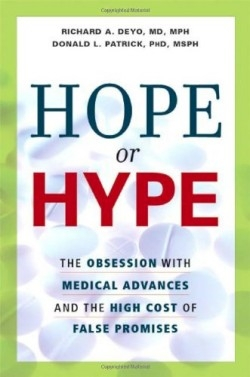Hope or Hype
The Obsession with Medical Advances and the High Cost of False Promises
Consumers have become accustomed to instant gratification in their daily lives. Their expectations regarding the medical industry are no different. They want instant cures and the newest and trendiest in technology. The competitive medical community is all too often ready to try to satisfy with promises that sometimes ring hollow.
This cautionary book warns consumers, doctors, pharmaceutical executives, politicians, and the media all to step back and prevent this medical carousel from going any faster. New products with high price tags are sometimes marketed aggressively at the expense of tried-and-true older medications, and doctors’ courses of action towards their patients may be influenced by free trips and perks from medical suppliers to practice certain medical procedures over others.
The co-authors have tackled a sprawling multi-billion-dollar issue in a way that clearly lays out the problems, and offers plenty of anecdotal examples along with some possible solutions. They also supply about thirty-five pages of reference material and footnotes to support their argument.
Numerous topical cartoons are sprinkled throughout the book, to lighten up the subject, but also to drive home specific points. One point is that a doctor, facing a barrage of new medicines on the market, may not really know how good the medicine is. In one cartoon, a doctor hands a prescription to a patient and says, “Take these pills three times a day, unless you read in the paper that they’ve been proven ineffective.”
The co-authors are professors at the University of Washington, and in constant touch with this push-and-pull conflict that consumers, medical practitioners, and regulators deal with daily. Deyo, a medical doctor, was co-recipient of the Nellie Westerman Prize for research in medical ethics, and he directs the university’s Center for Cost and Outcomes Research. Patrick is noted for his work on the links between quality of life, cost-effectiveness, and health policy. In the book, each describes personal experiences with the medical industry.
To minimize potential outside influence on their writing and opinions in this book, Deyo and Patrick got funding for their research from the Robert Wood Johnson Foundation. Pure independence can be difficult to achieve, they note in their preface. The foundation they rely on was created from the estate of a Johnson & Johnson chief executive officer whose father and uncle founded the company.
“So even though the foundation is independent of the Johnson & Johnson Company,” the authors write, “profits from the pharmaceutical industry at least indirectly supported this book.”
As medical care grows in complexity and importance, this book helps readers stand back and look at the situation thoroughly but without being overwhelmed. Hope or Hype needs to find its way into homes and doctors’ offices and into the hallways of Capitol Hill.
Reviewed by
Karl Kunkel
Disclosure: This article is not an endorsement, but a review. The publisher of this book provided free copies of the book to have their book reviewed by a professional reviewer. No fee was paid by the publisher for this review. Foreword Reviews only recommends books that we love. Foreword Magazine, Inc. is disclosing this in accordance with the Federal Trade Commission’s 16 CFR, Part 255.

